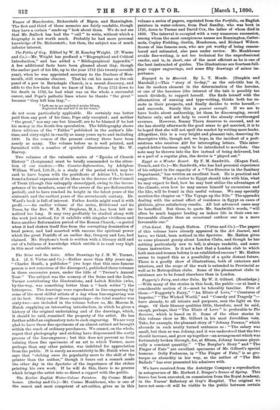The Fables of Gay. Edited by W. H. Kearley Wright.
(F. Warne and Co.)—Mr. Wright has prefixed a "Biographical and Critical Introduction," and has added a "Bibliographical Appendix." A few additional facts have been gleaned about Gay, though the earlier part of his life, up to the year 1712 (his twenty-seventh year), when he was appointed secretary to the Duchess of Mon- mouth, still remains obscure. That he cut his name on the oak panel of a pew in Barnstaple Church, is a recent discovery, and adds to the few facts that we know of him. From 1712 down to his death in 1732, he had what was on the whole a successful -career, and Pope's pathetic lines where he thanks "the great" because "they left him Gay,"— " Left me to see neglected genius bloom.
Neglected die and tell it on his tomb,"
do not seem particularly applicable. He certainly was better paid than any poet of his time, Pope only excepted; and neither "the great," nor any one but himself, are to be blamed if he lost his money in the South-Sea speculation. The bibliography shows three editions of the " Fables " published in the author's life- time, and sixty-eight in exactly as many years up to and including 1800. In the course of the present century there have been nearly as many. The volume before us is well printed, and furnished with a number of spirited illustrations by Mr. W. Harvey.
Two volumes of the valuable series of "Epochs of Church History" (Longmans) must be briefly commended to the atten- tion of our readers :—The Counter-Reformation, by Adolphus William Ward, Litt.D., is a study of the period which may be said to have begun with the pontificate of Adrian VI., to have found a formal expression of its ideas in the decrees of the Council of Trent (though this unhappily stereotyped, owing to the incom- petence of its members, some of the errors of the pre-Reformation period), and to have reached its height in the latest years of the sixteenth and the earliest years of the seventeenth century. Dr. Ward's book is full of interest. Father Austin might read it with profit.—An earlier volume of the series, Hildebrand and his Times, by the Rev. W. R. W. Stephens, M.A., has been left un- noticed too long. It may very profitably be studied along with the work just noticed, for it exhibits with singular vividness and force another Reformation period of the Roman Church,—a period when it had shaken itself free from the corrupting domination of local power, and had asserted with success the spiritual power -which the great Pontiffs of an earlier day, Gregory and Leo, had -claimed. Mr. Stephens's book is written with a literary skill and out of a fullness of knowledge which entitle it to rank very high in this most valuable series.






































 Previous page
Previous page